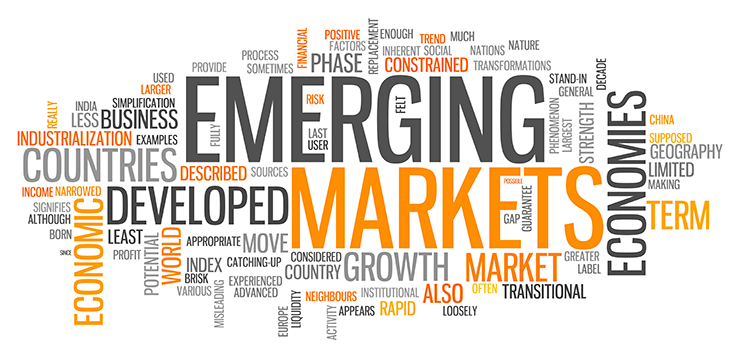
Emerging markets (EMs) represent a unique and dynamic investment opportunity, characterized by rapidly growing economies, expanding middle classes, and evolving infrastructure. However, like any investment, they come with their own set of challenges and risks. In this article, we’ll explore the opportunities and risks of investing in emerging markets and provide answers to some frequently asked questions to help you make informed decisions.
What Are Emerging Markets?
Emerging markets are nations with economies that are progressing toward becoming more advanced, typically characterized by faster growth rates, greater industrialization, and higher potential returns on investment. These markets are often found in regions like Asia, Africa, Eastern Europe, and Latin America. Countries such as China, India, Brazil, and South Africa are prime examples of emerging markets.
Opportunities in Emerging Markets
- Higher Growth Potential One of the most appealing aspects of emerging markets is their growth potential. As these economies develop, they often experience growth rates far outpacing those of developed markets. For instance, countries like China and India have seen rapid GDP growth over the past few decades, making them attractive for investors seeking higher returns.
- Diverse Investment Options Investors have access to a broad range of opportunities in emerging markets, from stocks and bonds to real estate and commodities. This variety allows you to diversify your investment portfolio and hedge against volatility in more stable economies.
- Growing Middle Class In many emerging economies, a growing middle class is driving demand for goods and services, making them ideal for consumer-driven investments. This demographic shift creates new business opportunities, particularly in sectors such as retail, technology, and healthcare.
- Commodity Richness Emerging markets often have vast natural resources, including oil, gas, minerals, and agricultural products. Countries like Brazil, Russia, and South Africa are key players in global commodity markets, and investing in these markets can provide exposure to essential resources.
- Access to Innovation As many emerging markets become more industrialized, they also foster innovation, particularly in technology, infrastructure, and financial services. Investment in these sectors can yield significant returns as these nations modernize and integrate with the global economy.
Risks of Investing in Emerging Markets
- Political Instability Many emerging markets face political instability, which can lead to sudden changes in government, shifts in policy, and economic turmoil. Political events, such as coups or elections, can create uncertainties that may impact investment outcomes.
- Currency Volatility Currency fluctuations are a significant risk in emerging markets, as they can lead to sudden changes in the value of your investments. For example, a devaluation of the local currency can result in losses for investors when converting back to their home currency.
- Economic Vulnerability Emerging economies are often more susceptible to external economic factors such as global commodity price changes, foreign debt crises, or fluctuations in global interest rates. A downturn in the global economy can significantly affect these markets.
- Underdeveloped Infrastructure In some emerging markets, infrastructure may still be underdeveloped, limiting business opportunities and economic growth. Poor transportation networks, unreliable power grids, and limited internet access can impede growth and affect business operations.
- Regulatory Risks Emerging markets may have less transparent regulatory systems, and changes in laws, taxes, or trade policies can pose a risk to investments. The legal environment may be less predictable compared to developed markets, making it difficult to safeguard investments.
Read More: https://wealthfitlife.com/10-common-investment-mistakes-to-avoid-as-a-new-investor/
FAQs
- What is the best way to invest in emerging markets? The best way to invest depends on your risk tolerance and investment goals. Popular options include investing in ETFs (exchange-traded funds), mutual funds, or individual stocks from emerging market companies.
- What are the most popular emerging markets for investment? Some of the most popular emerging markets include China, India, Brazil, Russia, South Africa, and Mexico. These countries have large populations, growing economies, and are involved in global trade.
- How do I manage risk when investing in emerging markets? Diversification is key. Spreading your investments across different sectors and countries can help mitigate risk. You can also consider hedging through currency-hedged ETFs or invest in funds that specialize in emerging markets.
- What are the biggest risks when investing in emerging markets? The biggest risks include political instability, currency fluctuations, economic vulnerability, and underdeveloped infrastructure. These factors can significantly affect the stability and profitability of your investments.
- Are emerging markets suitable for long-term investors? Yes, emerging markets can be excellent for long-term investors seeking higher growth potential. However, it’s essential to stay informed and be prepared for short-term volatility.
- What sectors offer the best investment opportunities in emerging markets? Sectors such as technology, infrastructure, consumer goods, energy, and financial services tend to perform well in emerging markets due to rapid growth and increasing demand.
- How do political changes affect investments in emerging markets? Political instability can lead to sudden changes in policies, currency devaluation, or even civil unrest, all of which can impact the performance of investments in these regions.
- Should I invest in emerging markets during a recession? Investing during a recession can be risky, but it may also present opportunities to buy undervalued assets. However, it’s crucial to conduct thorough research and consider your investment horizon and risk tolerance.
- Is there any way to reduce currency risk in emerging markets? One way to reduce currency risk is to invest in currency-hedged funds. Additionally, diversifying your investments across multiple currencies and markets can mitigate the impact of currency fluctuations.
- Can emerging markets investments be part of a diversified portfolio? Yes, emerging markets can play a vital role in portfolio diversification. By adding exposure to developing economies, you can balance risks and opportunities in your overall investment strategy.
Conclusion
Investing in emerging markets offers exciting growth potential, but it is not without its challenges. By understanding the opportunities and risks, conducting thorough research, and diversifying your investments, you can make informed decisions that align with your financial goals. As always, consider consulting a financial advisor to help navigate the complexities of these dynamic markets and optimize your investment strategy.
